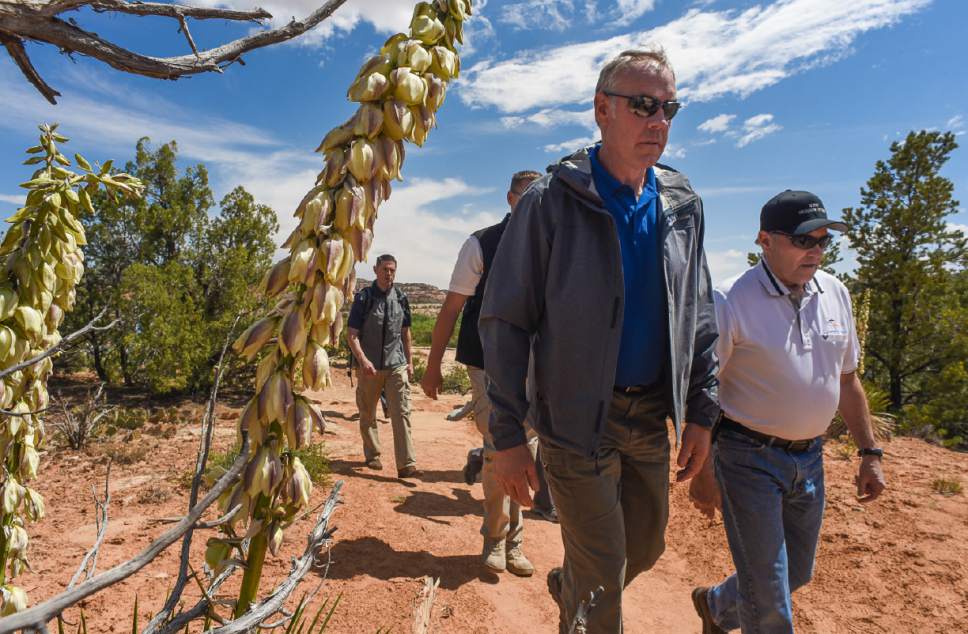This is an archived article that was published on sltrib.com in 2017, and information in the article may be outdated. It is provided only for personal research purposes and may not be reprinted.
The best thing that Interior Secretary Ryan Zinke could have done about the Bears Ears National Monument in southeastern Utah was absolutely nothing.
He could have made a firm recommendation to the president to leave the monument designation in place and allow the process of managing, and adapting to, the new status of all that already-federally owned land to go forward at its own pace.
What Zinke did was tantalizingly close to that.
By admitting that some of the area deserves eternal protection, making a vague suggestion about redrawing the monument's borders, calling on Congress to get involved and extending the time for public comments, the secretary has created a little breathing room.
He has left open the possibility that, when it is all over, a significant amount of land that is sacred to the area's Native Americans will be indeed protected, that the tribes involved will possess some unquestioned legal authority over what happens there and that future monument designations will be done in a way that creates more consensus and less division.
Of course, Zinke has also left open a door that could be exploited by some who forget that the land involved has long been the common property of all the people of the United States, who ignore the need to view whole ecosystems as worthy of protection and who show little or no regard for the legitimate spiritual needs of the Native peoples who have been tied to the land for thousands of years.
The monument was designated by President Obama in his final weeks in office. He waited, partly to minimize the political fallout that might have harmed fellow Democrats, but also to give Utah Reps. Rob Bishop and Jason Chaffetz a full and fair chance to settle rival dreams for the future of the area through their Public Lands Initiative.
That was procedurally the right thing to do. PLI, in theory, was a purposefully long process of seeking input from various stakeholders and seeking to balance their interests and needs. And settling the dispute with a well-negotiated act of Congress, rather than a presidential edict, would have been the ideal approach.
Would have been, until Bishop and Chaffetz shut out the Indians and gave veto power to local elected officials, officials who cling to pipe dreams of oil, coal and uranium wealth and are blind to the prospects of a sustainable economy based on tourism and preservation.
The state's wailing anger in reply to the monument designation was no example of collaboration and inclusion. It did serious damage to Utah's reputation as a public lands state, foolishly antagonizing that sector of the economy and pushing the lucrative Outdoor Retailers trade show to decamp for a friendlier environment.
Of course, anyone who loses a public policy dispute is certain to complain that they weren't heard. That's what monument opponents, all the way up to Gov. Gary Herbert and Sen. Orrin Hatch, claim — ignoring the fact that Zinke's predecessor, Sally Jewell, visited the area more than once and heard out all the rivals at great length.
But even that openness wasn't enough to satisfy monument opponents. And it wasn't required by law, and so isn't binding on this or any future administration, both as they create national monuments and as they — though the legality of such a move remains doubtful — reduce or eliminate them.
If, by some miracle, Congress becomes a functional legislative body again, it should take up the question of Bears Ears in particular and the Antiquities Act in general. It should write into the law a more collaborative process, with provisions for hearings and comments similar to those found in other statutes, still reserving for the president the final power to designate monuments.
Congress, ideally, should also hammer out a permanent designation — be it national parks, recreation areas or historic preserves — for the area, tilting as far as it can in favor not only of the interests and needs of the Native Nations, but also formalizing into law their role in writing the management plan.
That fact that Chaffetz, who is resigning his seat the end of this month, is about to be replaced as the representative for the area may help restart the process.
Until that happens, Bears Ears should remain just the national monument it has been designated. Because, right now, nobody has a better idea.



